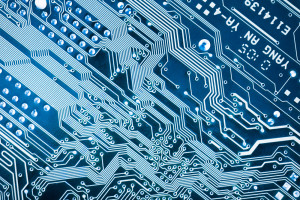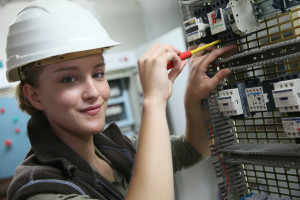Electrical Engineer
An electrical engineer is someone who designs and develops new electrical equipment, solves problems and tests equipment, and  ensures power reaches all devices that need it. They work with all kinds of electrical devices, from the smallest of chips to large power producers.
ensures power reaches all devices that need it. They work with all kinds of electrical devices, from the smallest of chips to large power producers.
Electrical engineering deals with electricity, electro-magnetism and electronics. It also covers power, control systems, telecommunications and signal processing. These engineers are usually concerned with large-scale electrical systems such as motor control and power transmission, as well as utilizing electricity to transmit energy. Electrical engineers may work on a diverse range of technologies, from the design of household appliances, lighting and wiring of buildings, telecommunication systems, electrical power stations and satellite communications. They may plan their designs using computer-aided software or they may also sketch ideas by hand.
What does an Electrical Engineer do?
They ensure that the correct current reaches the correct component with the most efficient current. Electrical engineers work on a variety of projects, such as computers, robots, cell phones, cards, radars, navigation systems, wiring and lighting in buildings and other kinds of electrical systems.
In some cases electrical engineers start out a project by defining what new electronic devices should be able to do. They will then design the circuits and parts of the electronics using a computer. They will create a prototype and test the product to improve it. Most products do not work initially or have some bugs that need to be fixed. The electrical engineer needs to figure out the problem and make the product work. In other cases they ensure the transmission lines flow into a substation from which the power then gets distributed throughout the plant.
There are many sub-disciplines of electrical engineering. Some electrical engineers specialize exclusively in one sub-discipline, while others specialize in a combination of sub-disciplines. The most popular sub-disciplines are:
Electronic Engineer
– deals with electronic circuits such as resistors, capacitors, inductors, transistors and diodes
Microelectronics Engineer
– deals with design and micro-fabrication of tiny electronic circuit components
Signal Processing Engineer
 – deals with signals, such as analog or digital signals
– deals with signals, such as analog or digital signals
Power Engineer
– deals with electricity and design of related electrical devices such as transformers, generators, motors and power electronics
Control Engineer
– deals with design of controllers that cause systems to behave in a certain way, using micro-controllers, programmable logic controllers, digital signal processors and electrical circuits
Telecommunications Engineer
– deals with transmission of information via a cable or optical fiber
Instrumentation Engineer
– deals with the design of measuring devices for pressure, flow and temperature. This involves a deep understanding of physics

Recent Comments